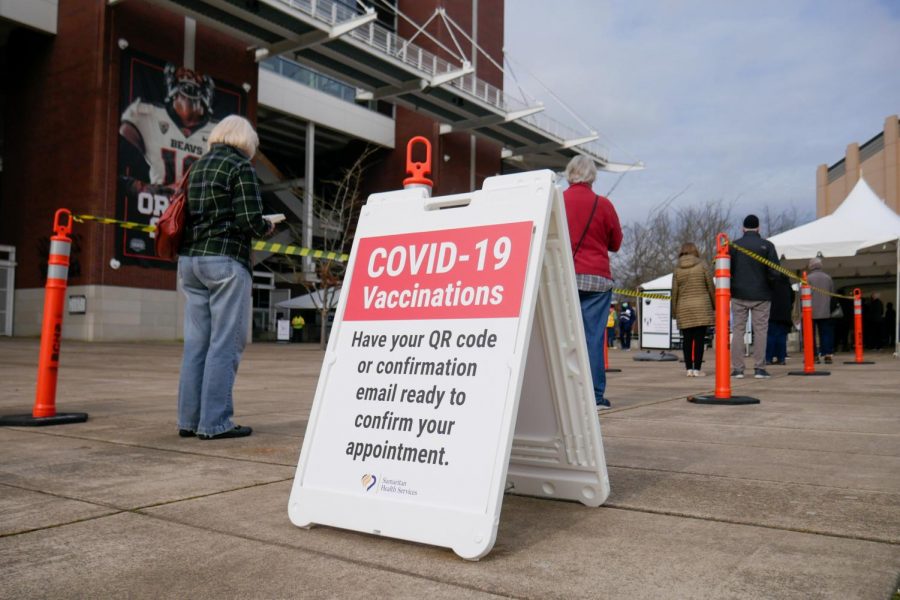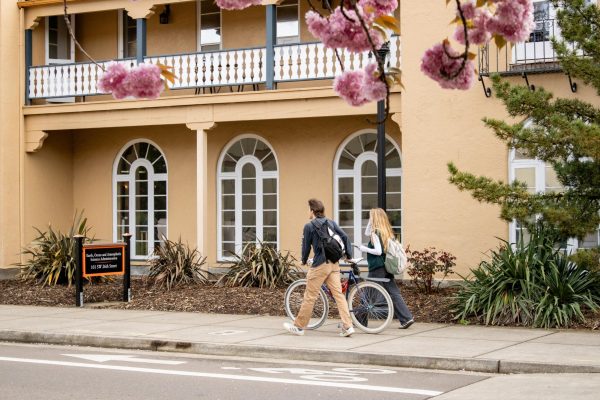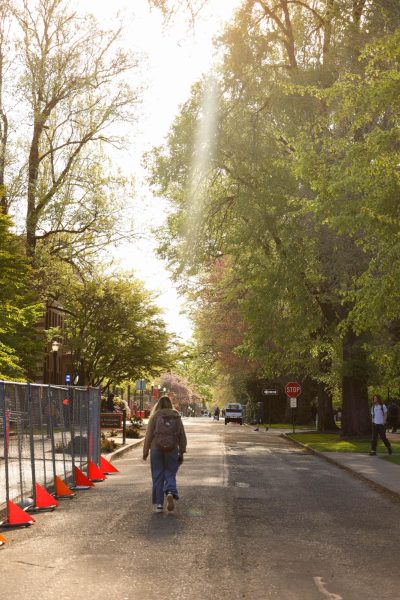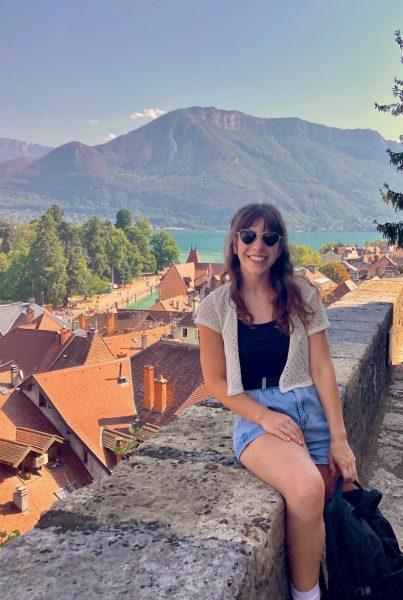Malick: COVID-19 vaccines are crucial for in-person learning
April 12, 2021
After 12 months of living in a global pandemic, there is light at the end of the tunnel. Oregon’s vaccination plan is making good progress and there is hope for in-person classes in the fall.
On March 11, United States President Joe Biden made an announcement, directing “states, Tribes, and territories to make all adults eligible for the COVID-19 vaccine no later than May 1.”
On March 3, in response to a previous announcement from Biden, the Oregon State University community received an email from former OSU President F. King Alexander stating that planning had begun for in-person classes for fall 2021.
This announcement builds even more anticipation for college students. For some, it will be our first term on campus, even though it is not our first term at OSU. As one of those students, I’m counting the days until I’m eligible to get my vaccine. By getting my COVID-19 vaccine, I’m protecting my college experience.
As of April 9, according to data from the New York Times, about 20.6% of Oregonians are fully vaccinated and 33.4% of Oregonians have received their first dose of the vaccine.
“I think what we’ve demonstrated as a nation is the capacity to produce the vaccines, and now we are improving how we distribute them. [. . .] I think what we need to do now, going forward, is to focus on building understanding and confidence and acceptance of being vaccinated among all Oregonians of all ages, and among Oregonians of diverse populations and underrepresented groups,” said Steve Clark, vice president for University Relations & Marketing at OSU.
Oregon is following the vaccine distribution plan created by the Oregon Health Authority. As of April 2, the plan is in Phase 1B, with groups one through six currently being vaccinated.
Phase 1B, groups one through five include childcare providers, early learning and K-12 educators and staff, as well as people 65 and older. Group six covers a much larger group of people, including those 45 to 64 with underlying conditions, pregnant people 16 and older, seafood and agricultural workers, wildland firefighters and people displaced by wildfires and more.
Benton County Health Department collaborated with OSU and Samaritan Health Services and have been hosting mass COVID-19 vaccination clinics at Reser Stadium on OSU’s Corvallis campus.
“The Reser clinic will serve an important central access point for both OSU and the surrounding community,” said Jenny Haubenreiser, executive director of Student Health Services.
In order for the students, staff and faculty of OSU to get vaccinated and be prepared for on-campus classes to return, it is important for members of the OSU community who do not live full-time in Corvallis to have access to the vaccine when they return for the fall.
According to Haubenreiser, the collaboration between Benton County and Samaritan Health Services and OSU has been able to increase access to vaccines locally through the Reser Stadium vaccine clinic. The clinic dates and times can expand as more doses become available.
Before eligibility extends to all adults no later than May 1, Phase 1B must be completed. Phase 1B Group 7’s eligibility extends to them no later than April 5. Luckily, Oregon continues to move forward quickly.
On March 26, Oregon Governor Kate Brown announced that people in Phase 1B, Group 7 will become eligible for vaccination beginning on April 5. This accelerates the vaccination schedule by roughly two weeks.
“Locally, we have been administering the Pfizer and Moderna vaccines, both of which require two doses to promote a full immune response,” Haubenreiser said. “The second dose of the Pfizer vaccine should be administered 21 days after the first dose, and the second Moderna vaccine should be administered 28 days after the first dose. People are considered fully vaccinated 14 days after the final dose. ”
In the United States, there are currently three different COVID-19 vaccines being administered: the Moderna vaccine, the Pfizer vaccine and the Johnson & Johnson vaccine. The Pfizer vaccine is most difficult to store, but has the longest shelf life; it must be stored at -112° to -76° Fahrenheit and is good for six months.
Alternatively, the Moderna and Johnson & Johnson vaccines have similar temperature requirements. The Moderna vaccine must be kept at 35° to 46° Fahrenheit, and will last for 30 days. The J&J vaccine requires a storage temperature of 35.6° to 46.4° Fahrenheit, but can be stored for three months. The J&J vaccine is a one-dose vaccine.
“Oregon has begun receiving the one-dose Johnson & Johnson vaccine and is allocating the vaccine across the state, including retail pharmacies. At this time, we do not know how many J&J vaccines will be offered at the Reser Stadium clinic or elsewhere within the county. People are advised to take whichever vaccine is made available as all vaccines are considered effective,” Haubenreiser said.
The Johnson & Johnson vaccine may appeal more to some because of its simplicity, but I don’t have a preference on the vaccine I get. As friends and family receive the vaccines, I know that they are significantly safer. That’s what matters, not the brand name on the vaccine.
Under Brown’s original vaccination plan, most college students would have been in Phase 2, Group 2 and would not have been eligible to get the vaccine until July. In an announcement released by the Governor’s office on March 19, however, Brown confirmed the acceleration of Oregon’s vaccination plan.
Each time the vaccination plan accelerates, it brings us all closer to a “normal” summer and an on-campus fall. We all want to see friends and family again this year, and it looks like we may achieve that goal.
“The Oregon Health Authority tells me that, provided supplies come in from the federal government as anticipated, we expect to have enough doses for every Oregonian who wants a vaccine to have the opportunity for at least a first dose by the end of May. That makes me smile. I hope it does for you too. The future’s looking brighter every day,” Brown said in her March 19 announcement.
More information for Benton County residents eligible for a COVID-19 vaccine and how to create an appointment at a vaccine clinic can be found here.






















































































































